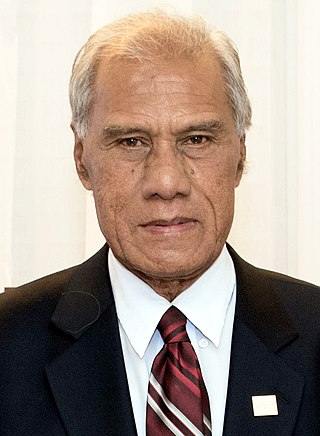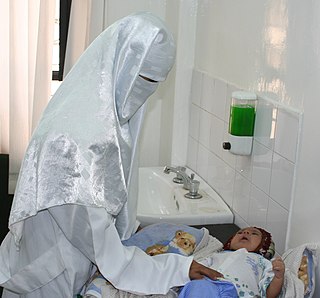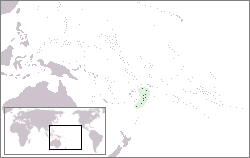Related Research Articles

The Convention on the Elimination of all Forms of Discrimination Against Women (CEDAW) is an international treaty adopted in 1979 by the United Nations General Assembly. Described as an international bill of rights for women, it was instituted on 3 September 1981 and has been ratified by 189 states. Over fifty countries that have ratified the Convention have done so subject to certain declarations, reservations, and objections, including 38 countries who rejected the enforcement article 29, which addresses means of settlement for disputes concerning the interpretation or application of the convention. Australia's declaration noted the limitations on central government power resulting from its federal constitutional system. The United States and Palau have signed, but not ratified the treaty. The Holy See, Iran, Somalia, Sudan, and Tonga are not signatories to CEDAW.
Nauru is a small island country in the South Pacific. With a population of 13,649 it is the world's least populous independent republic. Nauru's government operates under its constitution, part two of which contains 'protection of fundamental rights and freedoms.' The Human Rights Council (UNHRC) carried out Nauru's Universal Periodic Review (UPR) in January 2011. The review was generally favourable with only a few areas of concern.

Samiuela ʻAkilisi Pōhiva was a Tongan pro-democracy activist and politician. Pohiva, the leader of the Democratic Party of the Friendly Islands (DPFI), served as the Prime Minister of Tonga from 2014 to his death in 2019. He was only the fourth commoner to serve as Prime Minister, and the first commoner to be elected to that position by Parliament rather than appointed by the King.

Women in Yemen have historically been placed at a disadvantage due to their gender, with a highly patriarchal society. Although the government of Yemen has made efforts that will improve the rights of women in Yemen, many cultural and religious norms, along with poor enforcement of this legislation from the Yemeni government, have prevented Yemeni women from having equal rights to men.
The feminist movement has effected change in Western society, including women's suffrage; greater access to education; more equitable pay with men; the right to initiate divorce proceedings; the right of women to make individual decisions regarding pregnancy ; and the right to own property.

Lesbian, gay, bisexual, and transgender (LGBT) persons in Tonga face legal challenges not experienced by non-LGBT residents. Homosexuality is illegal in Tonga, with a maximum penalty of 10 years imprisonment, but the law is not enforced.

The Council of Europe Convention on Preventing and Combating Violence Against Women and Domestic Violence, better known as the Istanbul Convention, is a human rights treaty of the Council of Europe opposing violence against women and domestic violence which was opened for signature on 11 May 2011, in Istanbul, Turkey. The convention aims at prevention of violence, victim protection and to end the impunity of perpetrators. As of March 2019, it has been signed by 45 countries and the European Union. On 12 March 2012, Turkey became the first country to ratify the convention, followed by 37 other countries and the European Union from 2013 to 2023. The Convention came into force on 1 August 2014. In 2021, Turkey became the first and only country to withdraw from the convention, after denouncing it on 20 March 2021. The convention ceased to be effective in Turkey on 1 July 2021, following its denunciation. On 1 June 2023 the Council of the European Union approved the EU's accession to the Istanbul Convention.
Tonga is a constitutional monarchy with a population of approximately 130,000. Politics and the economy are dominated by the king, the nobility, and a few prominent commoners. Economic, social and cultural rights are generally well respected. There are, however, a number of issues concerning protection of civil and political rights, particularly freedom of expression, and rights to political participation. Violence against women is a serious issue.
Samoa, officially the Independent State of Samoa, has a population of approximately 188,000 people. Samoa gained independence from New Zealand in 1962 and has a Westminster model of Parliamentary democracy which incorporates aspects of traditional practices. In 2016, Samoa ratified the Convention on the Rights of Persons with Disabilities CRPD and the three optional protocols to the CRC
The Cook Islands are 15 small islands scattered over 2 million km squared of the South Pacific. According to the latest census, the nation has a total population of approximately 18,000 people. Spread in population between the mainland capital, Rarotonga, and the Outer Islands mean inequality in terms of delivery of public services. Internal migration between Rarotonga and the Outer Islands is relatively high due to lack of schooling and employment opportunities, and increased living standards and availability of medical and educational services in Rarotonga.
Tuvalu is a small island nation in the South Pacific, located North of Fiji and North West of Samoa. The population at the 2012 census was 10,837. Tuvalu has a written constitution which includes a statement of rights influenced by the United Nations Universal Declaration of Human Rights and the European Convention on Human Rights. While most human rights in Tuvalu are respected, areas of concern include women’s rights and freedom of belief, as well as diminishing access to human rights in the face of global warming. The latter has played a major role in the implementation of human rights actions in Tuvalu given its geographical vulnerability and scarce resources.

Gender inequality can be found in various areas of Salvadoran life such as employment, health, education, political participation, and family life. Although women in El Salvador enjoy equal protection under the law, they are often at a disadvantage relative to their male counterparts. In the area of politics, women have the same rights as men, but the percentage of women in office compared to men is low. Though much progress has been made since the Salvadoran Civil War ended in 1992, women in El Salvador still face gender inequality.
Gender equality issues are becoming of increasing importance internationally, and in order to bridge gaps in the equality of men versus women, a thorough understanding of differing culture, gender norms, and the legal framework of a country is necessary to give policy suggestions that will decrease the discrimination women everywhere face. Tonga, a Pacific island kingdom, has low gender equality as measured by the Gender Inequality Index (GII).

Women in Tuvalu continue to maintain a traditional Polynesian culture within a predominantly Christian society. Tuvaluan cultural identity is sustained through an individual's connection to their home island. In the traditional community system in Tuvalu, each family has its own task, or salanga, to perform for the community. The skills of a family are passed on from parents to children. The women of Tuvalu participate in the traditional music of Tuvalu and in the creation of the art of Tuvalu including using cowrie and other shells in traditional handicrafts. There are opportunities of further education and paid employment with non-government organisations (NGOs) and government enterprises, education and health agencies being the primary opportunities for Tuvaluan women.
Gender inequality has been improving a lot in Bangladesh, inequalities in areas such as education and employment remain ongoing problems so women have little political freedom. In 2015, Bangladesh was ranked 139 out of 187 countries on the Human Development Index and 47 out 144 countries surveyed on the Gender Inequality Index in 2017. Many of the inequalities are result of extreme poverty and traditional gender norms centred on a patrilineal and patriarchal kinship system in rural areas.
ʻOfa Guttenbeil-Likiliki is a filmmaker and women's rights activist in Tonga and the Pacific. Guttenbeil-Likiliki has urged equality in women's economic and educational empowerment, in their political involvement and representation, in land reform, protection from violence, and has advocated for the ratification of the Convention on the Elimination of All Forms of Discrimination Against Women for over a decade. On 9 March 2015, her advocacy came to fruition when the Tongan government agreed that it was prepared to ratify the convention. Guttenbeil-Likiliki was twice nominated for the U.S. Secretary of State International Women of Courage Award (2012,2013) recognising her work in advocating for women and children's rights in Tonga.
Gender equality is the notion that each gender should receive equal treatment in all aspects of life, and that one should not be discriminated based on their sex. Gender equality is a human right, which is recognised under the United Nations Universal Declaration of Human Rights (UDHR).

Women living in Myanmar continue to face barriers to equality. After forty years of isolation, myths about the state of women's rights in Myanmar (Burma) were centered around the conception that Burmese women face less gender discrimination and have more rights than women in surrounding Southeast Asian nations. After Myanmar opened its borders in 2010, gender discrimination began to be seen by the international community. Currently, a variety of organizations--both domestic and international--strive to educate people that this is a misconception to better make strides towards protecting women's rights in Myanmar.
Examples of Gender inequality Papua New Guinea includes poverty, violence, limited access to education and health care, and witch hunts. Cases of violence against women in PNG are under reported. There is also a lack of services for women who experience violence. There are reports of sexual abuse by police officers, on arrest and whilst in police custody. These incidents lack documentation or investigation, consequently, perpetrators are rarely prosecuted or punished. The government of Papua New Guinea (PNG) has introduced legislation to combat these issues, though with limited success.
References
- 1 2 "Convention on the Elimination of All Forms of Discrimination against Women". United Nations Division for the Advancement of Women. Retrieved March 10, 2013.
- 1 2 "Tonga Country Profile: Human Development Indicators". United Nations Development Programme . Retrieved 24 November 2020.
- ↑ "Human Rights: 8. Convention on the Elimination of All Forms of Discrimination against Women". United Nations Treaty Collections. Retrieved March 10, 2013.
- 1 2 "Tongan Parliament decides not to ratify CEDAW" (Press Release, 18 September 2009), para 3. Retrieved 2011-06-21.
- ↑ "Meet the staff: 'Ofa-ki-Levuka Guttenbeil Likiliki, Director". Women and Children Crisis Centre (WCCC) Tonga. Retrieved 14 March 2015.
- ↑ Vaka'uta, Koro (10 March 2015). "Tonga cabinet agrees to ratify CEDAW". Radio New Zealand. Retrieved 14 March 2015.
- ↑ Vaka'uta, Koro (26 February 2015). "Tonga set to finally sign CEDAW". Radio New Zealand. Retrieved 14 March 2015.
- 1 2 3 4 5 'Ofa, Guttenbeil-Likiliki. "Advancing Women's Representation in Tonga". Pacific Islands Forum Secretariat. 2006. Retrieved March 10, 2013.
- 1 2 Moengangongo, Mosikaka (1986). "Tonga: Legal Constraint And Social Potentials". Land Rights of Pacific Women. Suva, Fiji: Institute of Pacific Studies of the University of the South Pacific. pp. 87–102. ISBN 978-9-820-20012-8.
- ↑ Spickard, Paul; Rondilla, Joanne L.; Wright, Debbie Hippolite (2002). Pacific Diaspora. Oahu: University of Hawai'i Press. pp. 271-272. ISBN 978-0-824-82619-2.
- ↑ "Fact sheet: The right to participation". Unicef. Retrieved March 10, 2013.
- 1 2 "Tonga launches violence against women initiatives". Pacific Islands Development Program/East-West Center. March 10, 2012.
- ↑ Section 29 of the Family Protection Act 2013 reads: "Subject to clause 12 of the Constitution, in addition to liability under this Act, a respondent may also be prosecuted under other criminal laws for the time being in force for his acts if the facts disclose the commission of a separate criminal offence under those provisions. Note: For example, (without limitation), assault, offences endangering life and health, grievous bodily harm, rape, other sexual offences, murder and manslaughter and sexual exploitation through people trafficking and smuggling"
- ↑ "Tonga passes Family Protection Bill". New Zealand Family Violence Clearinghouse. 17 September 2013. Retrieved 14 March 2015.